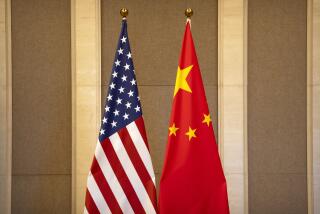More people see China as the world’s top economy, poll finds
- Share via
Never mind that the U.S. economy is about twice the size of China’s. More people than ever perceive the Asian giant as the world’s dominant economic power, according to a Pew Research Center global survey.
The results are believed to reflect popular opinion that the U.S. and Chinese economies are heading in opposite directions.
“The global financial crisis and the steady rise of China have led many to declare China the world’s economic leader,” said the report, which was released Wednesday and also addressed a series of global opinions on the perception of nations and their leaders.
For the first time, respondents around the world picked China as the world’s leading economy over the U.S., by a margin of 42% to 36%.
Asked the same question last year, a median of 41% said the U.S. is the world’s leading economy and only 35% picked China.
Even many American respondents said they believed China was ahead, with 41% saying China was the leading power and 40% saying the U.S.
Chinese respondents were more sanguine (and realistic), with 48% calling the U.S. the primary economic power and 29% choosing China.
There’s ample reason to believe that China is ascendant. The country was able to insulate itself from the 2008 financial crisis with minimal exposure to foreign banks. What it lost in trade it made up for with a massive stimulus plan. China is also sitting on a cache of $3.2 trillion in foreign reserves that many believe it can wield as a financial weapon.
But China’s path to global dominance is anything but assured and, at the very least, decades off, economists say.
In a research note released Thursday, Credit Suisse economist Dong Tao said China’s economic model was running out of steam and that the country could face weak growth for a prolonged period.
Dong said the state’s top-down structure is squeezing the private sector -- an important cog China will need to elevate its development.
“At this moment, China has largely consumed the benefits of previous reforms, and the economy needs a new structural breakthrough,” Dong wrote. “But instead, the leaders in Beijing have followed the example of their western counterparts by ‘printing money’ and spending fiscal dollars.”
He continued: “These kind of stimuli can help ease the pain on slow growth and prevent a hard landing, but are unlikely to generate upward growth momentum and take the economy to a new height, in our view. In fact, it seems that the government spending has crowded out private investment.”
RELATED:
China slashes key interest rate for first time since 2008
Inflation eases in China to two-year low amid economic slowdown
Chinese banks boosted lending in May in effort to bolster economy
More to Read
Inside the business of entertainment
The Wide Shot brings you news, analysis and insights on everything from streaming wars to production — and what it all means for the future.
You may occasionally receive promotional content from the Los Angeles Times.











